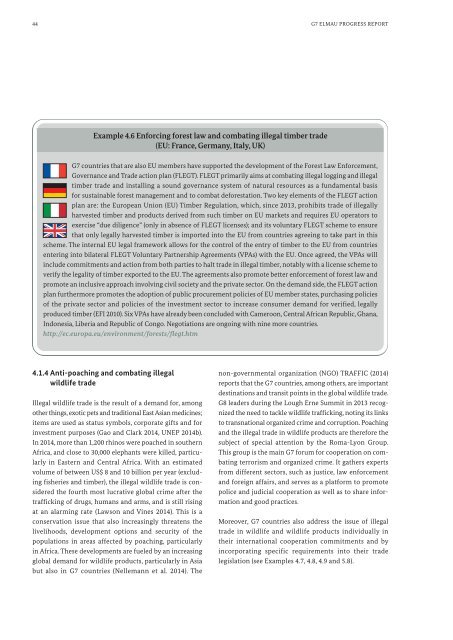G7-Elmau-Progress-Report-2015-Biodiversity-A-vital-foundation-for-sustainable-development
G7-Elmau-Progress-Report-2015-Biodiversity-A-vital-foundation-for-sustainable-development
G7-Elmau-Progress-Report-2015-Biodiversity-A-vital-foundation-for-sustainable-development
You also want an ePaper? Increase the reach of your titles
YUMPU automatically turns print PDFs into web optimized ePapers that Google loves.
44 <strong>G7</strong> ELMAU PROGRESS REPORTExample 4.6 En<strong>for</strong>cing <strong>for</strong>est law and combating illegal timber trade(EU: France, Germany, Italy, UK)<strong>G7</strong> countries that are also EU members have supported the <strong>development</strong> of the Forest Law En<strong>for</strong>cement,Governance and Trade action plan (FLEGT). FLEGT primarily aims at combating illegal logging and illegaltimber trade and installing a sound governance system of natural resources as a fundamental basis<strong>for</strong> <strong>sustainable</strong> <strong>for</strong>est management and to combat de<strong>for</strong>estation. Two key elements of the FLEGT actionplan are: the European Union (EU) Timber Regulation, which, since 2013, prohibits trade of illegallyharvested timber and products derived from such timber on EU markets and requires EU operators toexercise “due diligence” (only in absence of FLEGT licenses); and its voluntary FLEGT scheme to ensurethat only legally harvested timber is imported into the EU from countries agreeing to take part in thisscheme. The internal EU legal framework allows <strong>for</strong> the control of the entry of timber to the EU from countriesentering into bilateral FLEGT Voluntary Partnership Agreements (VPAs) with the EU. Once agreed, the VPAs willinclude commitments and action from both parties to halt trade in illegal timber, notably with a license scheme toverify the legality of timber exported to the EU. The agreements also promote better en<strong>for</strong>cement of <strong>for</strong>est law andpromote an inclusive approach involving civil society and the private sector. On the demand side, the FLEGT actionplan furthermore promotes the adoption of public procurement policies of EU member states, purchasing policiesof the private sector and policies of the investment sector to increase consumer demand <strong>for</strong> verified, legallyproduced timber (EFI 2010). Six VPAs have already been concluded with Cameroon, Central African Republic, Ghana,Indonesia, Liberia and Republic of Congo. Negotiations are ongoing with nine more countries.http://ec.europa.eu/environment/<strong>for</strong>ests/flegt.htm4.1.4 Anti-poaching and combating illegalwildlife tradeIllegal wildlife trade is the result of a demand <strong>for</strong>, amongother things, exotic pets and traditional East Asian medicines;items are used as status symbols, corporate gifts and <strong>for</strong>investment purposes (Gao and Clark 2014, UNEP 2014b).In 2014, more than 1,200 rhinos were poached in southernAfrica, and close to 30,000 elephants were killed, particularlyin Eastern and Central Africa. With an estimatedvolume of between US$ 8 and 10 billion per year (excludingfisheries and timber), the illegal wildlife trade is consideredthe fourth most lucrative global crime after thetrafficking of drugs, humans and arms, and is still risingat an alarming rate (Lawson and Vines 2014). This is aconservation issue that also increasingly threatens thelivelihoods, <strong>development</strong> options and security of thepopulations in areas affected by poaching, particularlyin Africa. These <strong>development</strong>s are fueled by an increasingglobal demand <strong>for</strong> wildlife products, particularly in Asiabut also in <strong>G7</strong> countries (Nellemann et al. 2014). Thenon-governmental organization (NGO) TRAFFIC (2014)reports that the <strong>G7</strong> countries, among others, are importantdestinations and transit points in the global wildlife trade.G8 leaders during the Lough Erne Summit in 2013 recognizedthe need to tackle wildlife trafficking, noting its linksto transnational organized crime and corruption. Poachingand the illegal trade in wildlife products are there<strong>for</strong>e thesubject of special attention by the Roma-Lyon Group.This group is the main <strong>G7</strong> <strong>for</strong>um <strong>for</strong> cooperation on combatingterrorism and organized crime. It gathers expertsfrom different sectors, such as justice, law en<strong>for</strong>cementand <strong>for</strong>eign affairs, and serves as a plat<strong>for</strong>m to promotepolice and judicial cooperation as well as to share in<strong>for</strong>mationand good practices.Moreover, <strong>G7</strong> countries also address the issue of illegaltrade in wildlife and wildlife products individually intheir international cooperation commitments and byincorporating specific requirements into their tradelegislation (see Examples 4.7, 4.8, 4.9 and 5.8).


